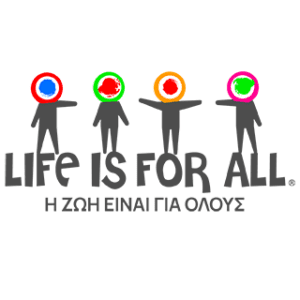who we are
Life is for All is a civic non-profit organization (AMKE). It was created out of the passion of a group of individuals who neither accept, nor tolerate the exclusion of people with differences. The purpose of Life is for All is to promote inclusion in the public life of those with learning differences, neurodevelopmental disorders and physical disabilities. We believe that inclusion is a fundamental human right.
Through responsible information and the understanding of what “neurodevelopmental disorders” mean, we can begin to create awareness and build a more caring society. We can overcome prejudices, taboos. We start small by getting heard, informing and creating inclusive events and circumstances wherever we can. We want people with differences out of their houses, where they can be seen, where one can interact with them and get to know them. We want them around us. Ultimately, society can accept people with differences and include them in every aspect of daily life. This is our goal.



what are
neurodevelopmental disorders?
Neurodevelopmental disorders are behavioural and cognitive conditions that emerge during the developmental period, leading to significant challenges in acquiring and performing specific mental, psychological, emotional, motor, or social-cognitive functions. The causes of neurodevelopmental disorders are complex and often remain unknown in many individual cases.
Neurodiversity, is used to describe the various ways the brain functions in terms of cognition, perception, emotion, learning, communication, and response to stimuli.
Children with neurodevelopmental disorders exhibit unique learning patterns and react differently to emotions such as sadness, joy, fear, anger, and anxiety. They often encounter difficulties in learning, socialization, communication, interaction, and behaviour. These challenges can significantly impact their performance in school and their ability to form and maintain social relationships.
it is the child who...
struggles with unpredictability, surprises, sudden changes in plans, alterations in his schedule and routine. He withdraws socially, displays rigid thinking, and exhibits obsessions. Often he misinterprets and misunderstands situations because he struggles to grasp others' intentions. It’s the child who struggles with socialization, particularly in terms of interaction, and does not have close friends.


the child who...
makes many spelling mistakes, cannot read correctly or fluently. He does not understand what he reads, and struggles to write what he has learned.

the child who...
has difficulties holding a pencil properly, using scissors, managing a glass or plate, constructing with plastic or wooden blocks, and matching shapes. He struggles with forming letters, his writing is illegible, and the presentation of his work is messy. It’s the child who has difficulty coordinating his movements, often trips, falls, and is clumsy. He can’t learn how to ride a bike, kick a soccer ball, or throw a ball accurately at a target.


the child who...
has a very limited attention span and is easily distracted. He struggles greatly with organization, with remembering what he needs to do, and keeping track of where his things are. He is the child who moves constantly, is impulsive in his actions and verbal responses.

the child who...
struggles to grasp the concept that numbers represent quantities and to connect numerical symbols with their corresponding words. He has difficulty with all arithmetic calculations and mixes up mathematical signs. It’s the child who struggles to comprehend the wording of math problems.


the child who...
has difficulty articulating certain phonemes or letters correctly and may have unintelligible speech. His vocabulary is limited, and he struggles to find the right words. It’s the child who interprets language literally, does not grasp complex and abstract concepts or intricate language. He has trouble organizing sentences both syntactically and in meaning.




